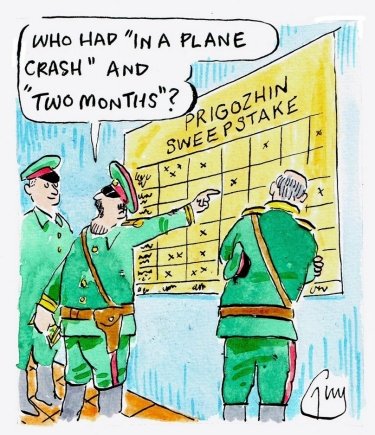
Yevgeny Prigozhin serving dinner to his tsar.
The Institute for the Study of War (ISW) published some interesting tidbits from an interview yesterday with Wagner Group Leader Yevgeny Prigozhin, a number of which statements explicitly contradict the Kremlin’s rationale for attacking Ukraine.
Wagner Group financier Yevgeny Prigozhin has softened his rhetoric towards the Russian Ministry of Defense (MoD) likely out of fear of completely losing his mercenary force in Bakhmut. Prigozhin emphasized his concerns about a possible Ukrainian counteroffensive in eastern Ukraine during a 23-minute interview on March 23. Prigozhin claimed that Ukraine has 200,000 reserves concentrating to attack along the entire eastern frontline, into Belgorod Oblast, and in Bakhmut. Prigozhin also claimed that the Ukrainians currently have 80,000 troops in Bakhmut, Slovyansk, and Kostyantynivka to counterattack Bakhmut – a claim that former Russian officer Igor Girkin observed was dubious. Prigozhin‘s exaggerated statements about the imminent threat to Russian forces are likely an attempt to secure more supplies and reinforcements from the Russian MoD to save his forces in Bakhmut. Prigozhin made several positive statements about the Russian MoD, even acknowledging that Russian MoD forces are fighting alongside Chechen units in Bilohorivka, Luhansk Oblast. Prigozhin also surprisingly promoted both Russian MoD-controlled volunteer recruitment efforts and recruitment into Wagner, instead of only advertising service with Wagner formations as he has usually done. Prigozhin expressed some generalized criticism of the Russian military bureaucracy – namely the defense industrial base (DIB) – but such criticisms echo the current state propaganda narrative. Prigozhin had been an avid critic of the Russian military command, and the softening of his rhetoric may indicate that he may be attempting to partially appease the Russian MoD to gain supplies or reinforcements for Wagner forces in Bakhmut.
Prigozhin denied the Kremlin’s claims that Russia is fighting NATO in Ukraine and questioned whether there are actually Nazis in Ukraine as the Kremlin constantly claims. Prigozhin stated that Russia is fighting “exclusively with Ukrainians” who are equipped with NATO-provided equipment and some “russophobic” mercenaries who voluntarily support Ukraine – but not NATO itself. Prigozhin also noted that Russian officials most likely knew that NATO would offer Ukraine military aid, because “it is ridiculous to think that when [Russia] decided to conduct this special military operation it did not account for NATO’s help to Ukraine.” Prigozhin noted that he is unsure about the “denazification” objectives in Ukraine, because he does not know if there are “Nazis” in Ukraine. Prigozhin also noted that Russia will ”demilitarize” Ukraine only when all of the Ukrainian military is destroyed, claiming that this effort is ongoing, but that it is unclear if it will be successful. Prigozhin stated that Russia can avoid an exhausting protracted war by deciding now which borders it wants to capture. Prigozhin also called on the Russian military and media to stop underestimating Ukrainian forces and engaging in internal conflicts. Prigozhin effectively rejected the Kremlin’s pre-war and post-war claims that Russia needed to defend itself against a NATO threat in Ukraine and undermined the necessity and probability of Russian President Vladimir Putin’s stated maximalist objectives for this invasion.
RTWT






